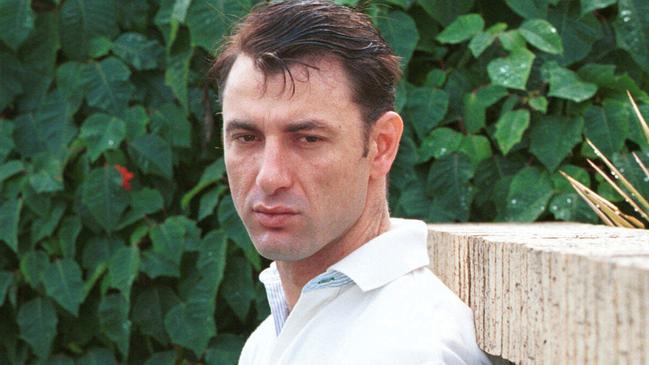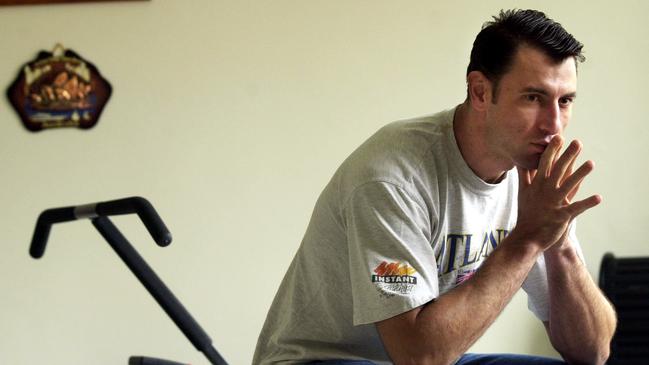Triple murderer Max Sica claims ‘corrupt’ cops planted murder weapon
Max Sica, the man responsible for one of Queensland’s worst murders, has claimed “corrupt” police investigating the case 20 years ago had omitted evidence and planted the murder weapon.

Police & Courts
Don't miss out on the headlines from Police & Courts. Followed categories will be added to My News.
Notorious triple murderer Max Sica has claimed “corrupt” police investigating the case 20 years ago had omitted evidence and planted the murder weapon.
Massimo “Max” Sica is currently serving a life sentence for murdering his former girlfriend Neelma Singh, along with her siblings Kunal and Sidhi, in April 2003.
The prosecution alleged throughout a lengthy trial in 2012 that Sica and Neelma had gotten into an argument which turned violent.
It was alleged Sica strangled Neelma to death and disfigured her face with a large garden fork – which he now claims was planted by “corrupt” police officers during investigations.
The fork had been found to have the blood of all three siblings on it, after their bodies were discovered in a spa bath at the Singhs’ Bridgeman Downs home.
Sica had been the one to call triple-0 at the time, sobbing over the phone: “I’ve got three bodies in a spa”.
He was charged with the murders five-and-a-half years later following extensive police investigations.

Sica claimed innocence throughout his trial, and called Queensland’s justice system “corrupt” after being found guilty of all three charges.
Justice John Byrne called him “manipulative and deceitful,” with the court hearing how Sica had previously been violent towards Neelma and had also distributed her intimate images without consent.
Sica has since made failed attempts to appeal his convictions, started petitions proclaiming his innocence, and implored Queensland’s former Governor Paul de Jersey for a pardon back in 2019.
Recent court documents have revealed how Sica took his case to the Crime and Corruption Commission (CCC) in 2023, urging them to investigate the Queensland Police Service (QPS) for corruption throughout the murder investigation.
An affidavit of his lawyer Jeff Douglas Johnson claims to have evidence reflecting “reasonable suspicion” that police planted the garden fork said to have been the murder weapon.
Mr Johnson said an enhanced version of a video taken in the garage three days prior to the garden fork being found there showed that the positioning of the garden implements had changed in those three days.

Mr Johnson further claimed there was reasonable suspicion that the “blackened footprints” found at the scene, suggested at trial to have been Sica’s, were also planted by the QPS.
He also raised allegations that the QPS and Department of Public Prosecutions had deliberately withheld certain evidence throughout the trial and failed to call all relevant witnesses.
The CCC found the allegations “lacked substance” and ultimately failed to support evidence that the QPS were “infected by acts of dishonesty or impartiality”.
They further concluded that taking action in respect to Sica’s allegations would not be a “justifiable use of resources”.
They noted Sica had already had the opportunity to ventilate the allegations at his appeal, and that he had had the opportunity to call witnesses at the time of trial.
According to court documents, Mr Johnson had claimed in response that Sica’s representatives at trial were “incompetent”.
“No amount of incompetence on the part of those that represented Mr Sica at trial excuses police corruption,” he said in an email to the CCC’s deputy chair Kathryn McMillan.
In October 2024, Sica filed an application taking the CCC to court in Brisbane’s civil Supreme Court jurisdiction.
He is seeking an order that the matter be referred back to the CCC on the basis that they allegedly failed to take into account “significant evidence of documented corruption”.
According to the court documents, Sica further alleges that they failed to follow proper decision making procedure, failed to conduct the review independently, and based their decision on irrelevant matters.
He is currently serving a life sentence at Wacol, with a non-parole period of 35 years.


